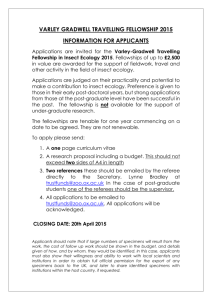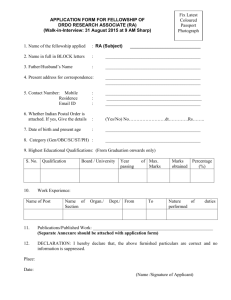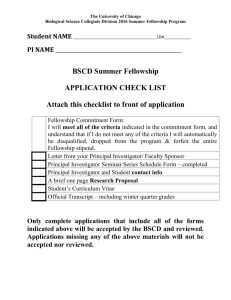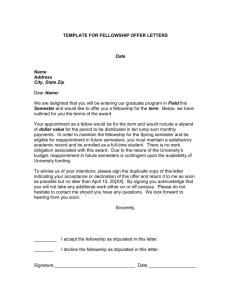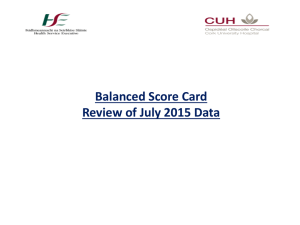downloaded here - Addenbrooke`s Charitable Trust
advertisement
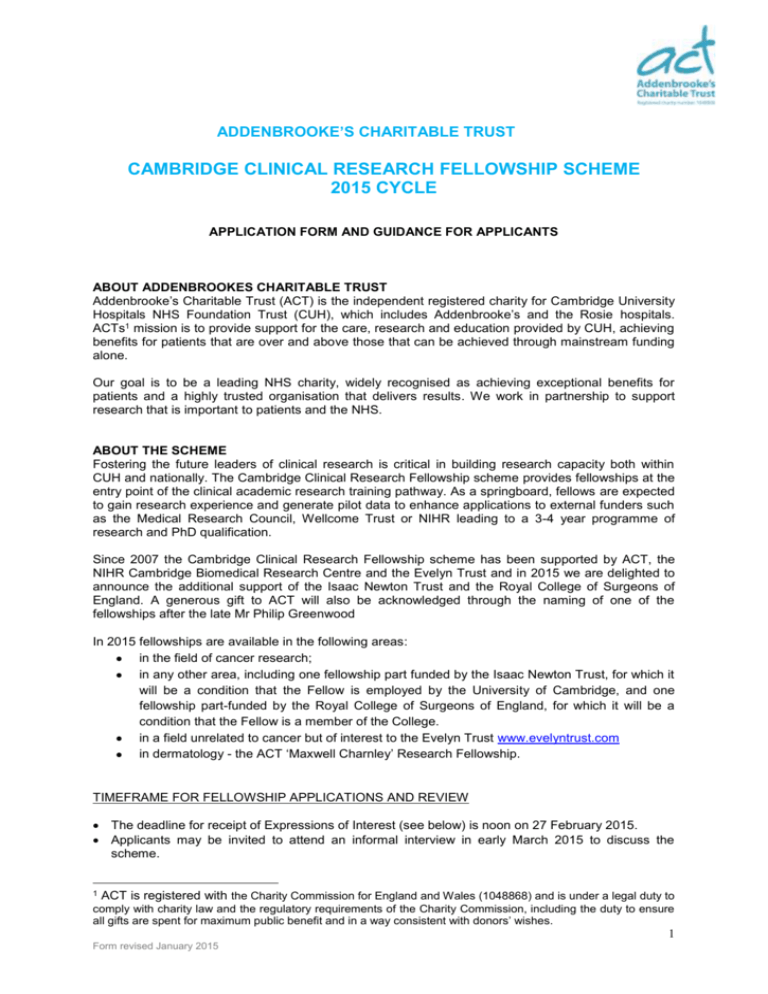
ADDENBROOKE’S CHARITABLE TRUST CAMBRIDGE CLINICAL RESEARCH FELLOWSHIP SCHEME 2015 CYCLE APPLICATION FORM AND GUIDANCE FOR APPLICANTS ABOUT ADDENBROOKES CHARITABLE TRUST Addenbrooke’s Charitable Trust (ACT) is the independent registered charity for Cambridge University Hospitals NHS Foundation Trust (CUH), which includes Addenbrooke’s and the Rosie hospitals. ACTs1 mission is to provide support for the care, research and education provided by CUH, achieving benefits for patients that are over and above those that can be achieved through mainstream funding alone. Our goal is to be a leading NHS charity, widely recognised as achieving exceptional benefits for patients and a highly trusted organisation that delivers results. We work in partnership to support research that is important to patients and the NHS. ABOUT THE SCHEME Fostering the future leaders of clinical research is critical in building research capacity both within CUH and nationally. The Cambridge Clinical Research Fellowship scheme provides fellowships at the entry point of the clinical academic research training pathway. As a springboard, fellows are expected to gain research experience and generate pilot data to enhance applications to external funders such as the Medical Research Council, Wellcome Trust or NIHR leading to a 3-4 year programme of research and PhD qualification. Since 2007 the Cambridge Clinical Research Fellowship scheme has been supported by ACT, the NIHR Cambridge Biomedical Research Centre and the Evelyn Trust and in 2015 we are delighted to announce the additional support of the Isaac Newton Trust and the Royal College of Surgeons of England. A generous gift to ACT will also be acknowledged through the naming of one of the fellowships after the late Mr Philip Greenwood In 2015 fellowships are available in the following areas: in the field of cancer research; in any other area, including one fellowship part funded by the Isaac Newton Trust, for which it will be a condition that the Fellow is employed by the University of Cambridge, and one fellowship part-funded by the Royal College of Surgeons of England, for which it will be a condition that the Fellow is a member of the College. in a field unrelated to cancer but of interest to the Evelyn Trust www.evelyntrust.com in dermatology - the ACT ‘Maxwell Charnley’ Research Fellowship. TIMEFRAME FOR FELLOWSHIP APPLICATIONS AND REVIEW The deadline for receipt of Expressions of Interest (see below) is noon on 27 February 2015. Applicants may be invited to attend an informal interview in early March 2015 to discuss the scheme. 1 ACT is registered with the Charity Commission for England and Wales (1048868) and is under a legal duty to comply with charity law and the regulatory requirements of the Charity Commission, including the duty to ensure all gifts are spent for maximum public benefit and in a way consistent with donors’ wishes. 1 Form revised January 2015 Candidates will be notified in April 2015 whether they will be invited to progress to the next stage and submit a full application. The deadline for receipt of full application shall be no later June 2015 (exact date to be advised). The applications will be considered by the Fellowship Review Panel (a sub-group of CUH’s Research Advisory Committee) and it is anticipated that interviews will be held in early July 2015. The recommendations of the Fellowship Review Panel are forwarded to the Evelyn Trust and ACT’s Grants Committee for consideration, and approved by ACT’s Trustees. Applicants will be advised by letter of the outcome. In general, a decision is made within four months of receipt of the completed full application. Applicants should take this into account when planning the start date of their proposed research. The expected start date for the fellowships is September / October 2015. PLEASE NOTE Incomplete applications will NOT be considered by the RAC. Funding will be awarded for a maximum of one year (or pro-rata for part-time fellowships). APPLYING FOR A CAMBRIDGE CLINICAL RESEARCH FELLOWSHIP ELIGIBILITY (persons and proposed project) Fellowship candidates should be trainee doctors who are post FY2; there is no requirement for fellowship candidates to have existing connections with CUH. Supervisors should hold a substantive or honorary contract with an NHS organisation in Cambridge or the surrounding area. The proposed research should be undertaken within an NHS Department or within the University of Cambridge. APPLICATIONS 1. Preliminary application In the first instance, fellowship candidates interested in applying to the scheme should email the complete cover sheet (Appendix A), a curriculum vitae, together with a covering letter explaining why they wish to apply. The CV should be no longer than two pages (10 font size minimum) and include how the fellowship will further the applicants career (300 words max) and a description of any previous research experience and research publications. Appendix A, CV and accompanying letter should be merged into a single PDF file and emailed to Claire Teager claire.teager@addenbrookes.nhs.uk by noon on 27th February 2015. It is not mandatory for a candidate to be based in or have existing connections with CUH. Applications from candidates without an identified potential supervisor and/or project are particularly welcomed since, at the preliminary stage, the Fellowship Review Panel can advise and assist in placing the candidate with an appropriate supervisor and in a research field of interest to the candidate. Applicants may be invited to attend for an informal interview in early March 2015 to discuss the scheme and their application. Candidates will be notified in April 2015 whether they will be invited to progress to the next stage and submit a full application. 2. Full application Full applications should be typewritten using a minimum 10 font size and include the following information merged into a single PDF file. Arrangements and the deadline for submission of the full application will be advised. Part 1 Cover sheet (see below Appendix B). Part 2 Outline of research proposal to include: Scientific abstract (limit 250 words) Lay summary (limit 200 words) including significance and benefits to patients 2 Form revised January 2015 Note: for successful applicants ACT uses the lay summary for publicity and fund raising purposes. DO NOT INCLUDE CONFIDENTIAL INFORMATION in the lay summary. Outline of the proposal (two pages max) to include: - Original Hypothesis - Aims / objectives - Background (including any preliminary supporting data if available) - Work plan Bibliography Budget – include the salary cost for the fellow*. An allowance for consumables will be included in a successful award. *Note: salary costs should be requested at full gross cost (please include all NI and superannuation as provided by the medical staffing team of the expected employer). Any additional salary costs not included in the application will not subsequently be funded. Part 3 CVs (two page maximum per person) Up to date CV for the candidate fellow including a description (300 words) of previous research experience and how the fellowship will further the applicant’s career; CV(s) for supervisor(s), which should list publications relevant to this proposal. Part 4 Endorsing the proposal Before the application is formally submitted, it should be reviewed and endorsed by the Academic Lead for the Directorate in which the research will be undertaken. This should include confirmation of the candidate fellow and supervisor’s eligibility and endorsement of the budget including ensuring that requests for salary are made in full i.e. include any add-on costs such as employer contributions. Review and selection criteria ACT is committed to efficient, fair and expert peer review and relies on CUH’s Research Advisory Committee (RAC). The objective of the Cambridge Clinical Research Fellowship scheme is to provide support for up to one year at the entry point of the training pathway, during which time it is anticipated fellows will apply for nationally competitive fellowships with a view to completing a higher degree. It is anticipated that substantive pilot data will be generated during the fellowship which will be used to strengthen external applications. These principals define the selection criteria (given below) that the Fellowship Review Panel may use to review and identify meritorious proposals: The personal qualities of the candidate including knowledge of clinical academic training and future aspirations; How the candidate will use the fellowship as a spring board towards their training and professional development as a clinical academic; The environment in which the research will be conducted and the training that will be provided; The nature of the proposed research project including the capacity to generate substantive pilot data or provide valuable experience in a specialist field; The likelihood of success i.e. meeting the objectives of the scheme culminating in submission of a competitive application to national fellowship schemes. Applicants will be invited to attend the review meeting to support their application and answer questions. Notification The Fellowship Review Panel forward their recommendations to the Evelyn Trust and to CUH’s RAC which in turn makes recommendations to ACT’s Grants Committee and Trustees. Applicants will be advised by letter of the outcome. In general, a decision is made within four months of receipt of the completed full application. Applicants should take this into account when planning the start date of their proposed research. Grantee’s obligations Successful applicants are expected to comply with ACT’s Research Awards Terms and Conditions including submission of progress reports for review by the RAC or the Grant Conditions of the Evelyn Trust. 3 Form revised January 2015 Appendix A: CAMBRDIGE CLINICAL RESEARCH TRAINING FELLOWSHIPS Preliminary application cover sheet 1. Candidate details Surname, Forename, Title Address for correspondence E-mail address Landline number/s Mobile number Bleep (if applicable) Employer and current position 4 Form revised January 2015 2. APPENDIX B: CAMBRDIGE CLINICAL RESEARCH TRAINING FELLOWSHIPS Full application cover sheet (4 parts) 1. Candidate details Surname, Forename, Title Address for correspondence E-mail address Landline number/s Mobile number Bleep (if applicable) Employer and current position Address where the research will be undertaken 2. Supervisor details (repeat if more than one supervisor ) Supervisor Surname, Forename, Title Institutional address for correspondence E-mail address Landline number/s Mobile number Bleep (if applicable) Employer and current position 3. About the proposal Title of proposed research Proposed start date Salary support requested (a consumables allowance will be awarded if the application is successful) Is the proposal under consideration elsewhere? Please be sure to include all employer contribution costs (all NI and superannuation as provided by the medical staffing team of the expected employer). Any additional salary costs not included in the application will not subsequently be funded. Yes/no (if yes give details) 5 Form revised January 2015 4. ETHICAL AND RESEARCH GOVERNANCE REQUIREMENTS Approval by the Local Research Ethics Committee: highlight which statement applies This project does not involve any form of work with human beings. This project has been approved by the Local Research Ethics Committee. This project has been submitted to the Local Research Ethics Committee. If yes, which sites____________________________________________ Working with animals in research: highlight which statement applies This project does not involve any form of work with animals. This project involves the use of animals and will take full account of the 3R principles (including animal welfare) and guidance set out in ‘Responsibility in the use of animals in bioscience research: Expectations of the major research council and charitable funding bodies (see http://www.mrc.ac.uk/newsevents/publications/responsibility-in-the-use-of-animals-in-research/) Working with human stem cells: highlight which statement applies This project does not involve any form of work with human stem cells. This project involves the use of human stem cells and will follow the ‘Code of Practice for the use of Human Stem Cell Lines’ adopted by the MRC (http://www.mrc.ac.uk/documents/pdf/code-of-practice-for-the-use-of-human-stem-cell-lines/) 6 Form revised January 2015

